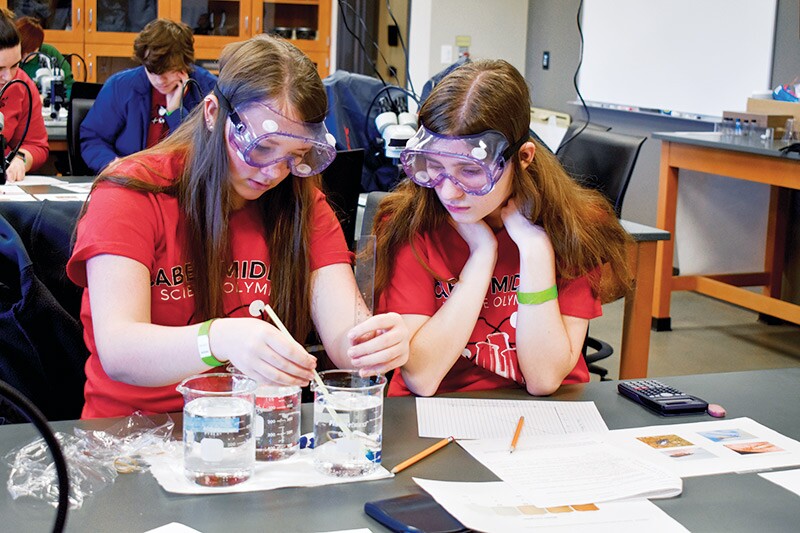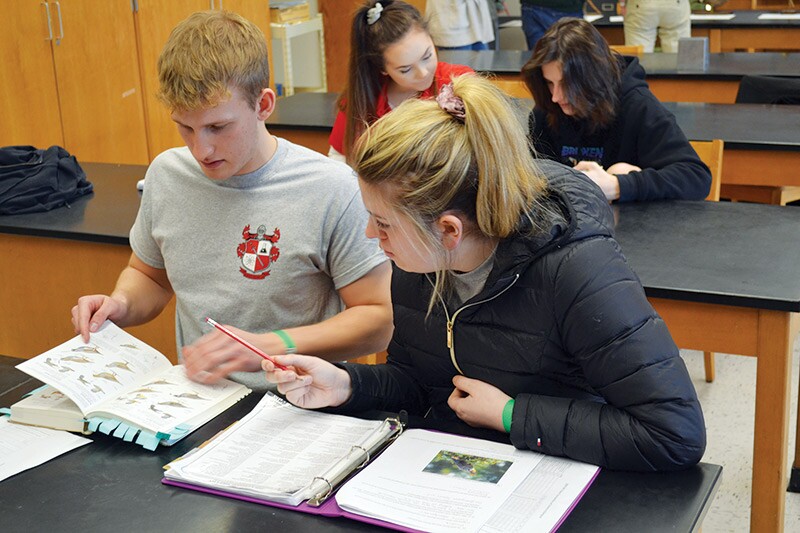Coaching West Virginia’s Top Science Olympiad Team for Nationals

High school students take part in the West Virginia Science Olympiad in 2019 and 2020. The 2021 competition was virtual.
After winning West Virginia’s Science Olympiad tournament early in 2021, the Cabell Midland High School team was looking ahead to the national tournament. To help them prepare, Marshall University’s SPS chapter partnered with the Science Olympiad student organization on campus in a new effort—to offer coaching for the competition.
The national tournament consists of 23 events that span the sciences. I coached team members participating in two events: Sounds of Music and Codebusters. In Sounds of Music, team members typically construct a unique musical instrument in advance, apply the fundamentals of acoustics and music theory, and present their work in front of a judge. Students also take a written test on acoustics and music theory, which is what we focused on during our sessions.
Codebusters challenges teams with an exam that includes a variety of ciphers, from simple substitution to Morse code. To break many of the codes, students must use algebraic techniques such as matrices. It’s an interesting event to study for, as it combines math and language. At least one cipher is in Spanish.
I didn’t know what coaching a high school Science Olympiad team would be like. During my first meeting with the students, we discussed their backgrounds and the topics they needed to concentrate on. It didn’t take me long to be impressed with their talent—they were quick learners and made some very clever connections.
After that first meeting, I met with the students once a week via Zoom. Each meeting focused on a particular topic and included opportunities for students to practice what they were learning. Fortunately, many previous tests are posted online, so we could practice questions similar to those they would see at nationals.
We held coaching sessions in the spring, as the state competition was in February and nationals were in May. This was at the height of Advanced Placement (AP) exams and, for the seniors on the team, college decision making. All of the students had extracurricular activities and were still navigating COVID-19. Still, they met with me each week and practiced for nationals on their own. I was really impressed by their work ethic. One student even attended a coaching session while on vacation. He said he preferred learning something new over relaxing.
There are so many talented and hard-working students who want to learn and hone their science skills. Coaching was a great way for our chapter to invest in them and in our community. As we look to the future, we hope this becomes an ongoing effort and helps establish a legacy of Science Olympiad participation and success among West Virginia high school students.

This opportunity for Science Olympiad coaching was made possible by the NASA West Virginia Space Grant Consortium, Grant No. 80NSSC20M0055.
About the Science Olympiad

The Science Olympiad is one of the top science competitions for middle and high school students in the United States. Each year, teams compete to represent their school and their state in a national tournament. Last year, about 5,000 teams participated in the Science Olympiad’s 375 live and remote tournaments covering all 50 states. To qualify for nationals, teams must first win their state tournament.
For many years West Virginia didn’t have a state tournament; to go to nationals, teams had to compete in a neighboring state’s tournament. That changed in 2015, when Dr. John Winfrey, then a physics professor at Marshall University, revived the West Virginia tournament. Marshall’s College of Science has hosted and managed the tournament ever since. With the exception of last year (due to COVID-19), high school participation has grown steadily over the past few years under the leadership of physics professor Dr. Sachiko McBride. McBride also advises the Science Olympiad student organization on campus that plays an active role in hosting the event and, now, coaching for nationals. The coaching effort was devised in an effort to boost West Virginia’s state ranking in the tournament.
For details on the Science Olympiad and to find out about your state tournament, visit www.soinc.org



